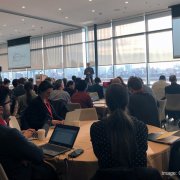MIT “Policy Congress” examines the complex terrain of artificial intelligence regulation.
by Peter Dizikes | MIT News Office
Scientists and policymakers converged at MIT on Tuesday to discuss one of the hardest problems in artificial intelligence: How to govern it.
The first MIT AI Policy Congress featured seven panel discussions sprawling across a variety of AI applications, and 25 speakers — including two former White House chiefs of staff, former cabinet secretaries, homeland security and defense policy chiefs, industry and civil society leaders, and leading researchers.
Their shared focus: how to harness the opportunities that AI is creating — across areas including transportation and safety, medicine, labor, criminal justice, and national security — while vigorously confronting challenges, including the potential for social bias, the need for transparency, and misteps that could stall AI innovation while exacerbating social problems in the United States and around the world.
“When it comes to AI in areas of public trust, the era of moving fast and breaking everything is over,” said R. David Edelman, director of the Project on Technology, the Economy, and National Security (TENS) at the MIT Internet Policy Research Initiative (IPRI), and a former special assistant to the president for economic and technology policy in the Obama White House.
Added Edelman: “There is simply too much at stake for all of us not to have a say.”
Daniel Weitzner, founding director of IPRI and a principal research scientist at the MIT Computer Science and Artificial Intelligence Laboratory (CSAIL), said a key objective of the dialogue was to help policy analysts feel confident about their ability to actively shape the effects of AI on society.
“I hope the policymakers come away with a clear sense that AI technology is not some immovable object, but rather that the right interaction between computer science, government, and society at large will help shape the development of new technology to address society’s needs,” Weitzner said at the close of the event.
The MIT AI Policy Congress was organized by IPRI, alongside a two-day meeting of the Organization for Economic Cooperation and Development (OECD), the Paris-based intergovernmental association, which is developing AI policy recommendations for 35 countries around the world. As part of the event, OECD experts took part in a half-day, hands-on training session in machine learning, as they trained and tested a neural network under the guidance of Hal Abelson, the Class of 1922 Professor of Computer Science and Engineering at MIT.
Tuesday’s forum also began with a primer on the state of the art in AI from Antonio Torralba, a professor in CSAIL and the Department of Electrical Engineering and Computer Science (EECS), and director of the MIT Quest for Intelligence. Noting that “there are so many things going on” in AI, Torralba quipped: “It’s very difficult to know what the future is, but it’s even harder to know what the present is...”
Read the full story on MIT News' website using the link below.

